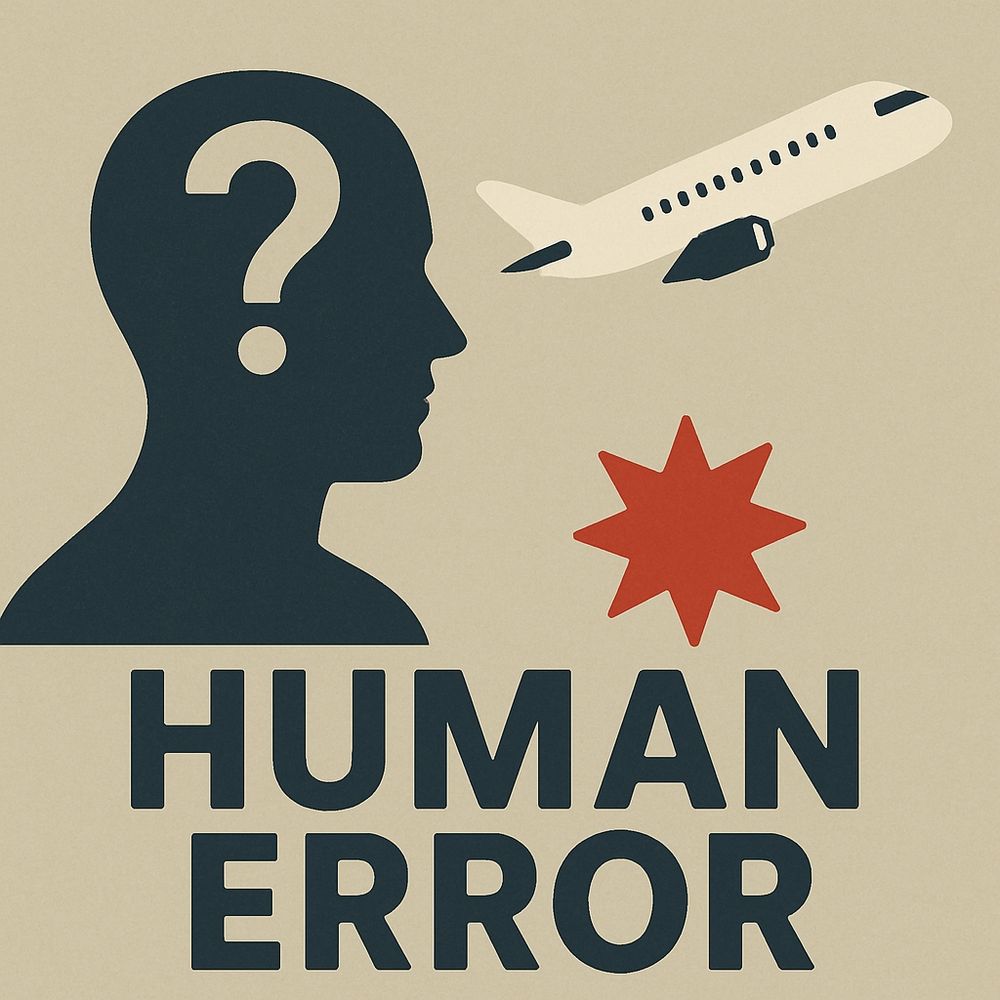“At 1:43 and some odd seconds, I felt the first shudder… a loud bang. Something was gravely wrong.”
The story of Greeneville — a U.S. Navy submarine, a routine drill, and a tragedy that shocked the world.
🎙️ Listen to the full episode now:
open.spotify.com/episode/1Tgb...
11.10.2025 09:30 — 👍 2 🔁 1 💬 0 📌 0
In 1968, a Japan Air Lines DC-8 landed in San Francisco Bay. No one died, but the captain’s blunt confession became legendary: “I f*cked up.”
But did self-blame help aviation safety - or hide the real lessons?
🎧 The Essence of Safety — new episode out now:
open.spotify.com/episode/1Tgb...
10.10.2025 15:55 — 👍 2 🔁 2 💬 0 📌 1

Guilt, Blame, and the Lessons We Miss
When a JAL DC-8 lands short of the runway in San Francisco Bay, its captain admits fault with disarming honesty. Decades later, a U.S. Navy submarine collides with a Japanese fishing vessel, and another captain shoulders the weight of guilt...
open.spotify.com/episode/1Tgb...
09.10.2025 17:41 — 👍 3 🔁 1 💬 0 📌 0
Exactly!
03.10.2025 08:10 — 👍 1 🔁 0 💬 1 📌 0
That's the one :)
02.10.2025 20:21 — 👍 2 🔁 0 💬 1 📌 0
Close, but not quite it.
02.10.2025 19:21 — 👍 1 🔁 0 💬 1 📌 0

A DC-8 airliner ditched in shallow waters. In front of it, a small patrol vessel.
After many months of research, I finally finished the write-up for the next episode - and started recording it. Unforeseen circumstances aside, I should publish it next week.
The first part is about this ⬇️ accident. Fortunately no-one got seriously hurt. Any idea what it was?
02.10.2025 14:30 — 👍 4 🔁 1 💬 1 📌 0
Crashing in a helicopter while on a crocodile egg gathering mission - only in Australia! 😄
30.08.2025 21:57 — 👍 2 🔁 0 💬 0 📌 0
YouTube video by Air Accidents Investigation Branch
Shoreham Airshow Accident, 22 August 2015
#OTD 2015 Shoreham youtu.be/u20-oh5Wblw #flightsafety #aviationsafety
22.08.2025 09:22 — 👍 2 🔁 2 💬 1 📌 0
Absolutely agree. Although I have used AVherald in the past, I have become increasingly concerned. That's why I was criticising this particular quote.
15.08.2025 14:54 — 👍 2 🔁 0 💬 0 📌 0
Fully agree on the first bit. As for any operator being willing to take the risk, I am not so sure. Ju-Air tried very hard, but looking at the obstacles they were facing in maintaining/regaining airworthiness, you realise that they are almost unsurmountable.
15.08.2025 13:11 — 👍 1 🔁 0 💬 1 📌 0

In 2019 the evacuation of a burning Aeroflot Sukhoi Superjet was hampered with fatal consequences. Why are passengers still taking hand luggage with them? #avgeek #aviation #safety www.aerosociety.com/news/a-bag-f...
15.08.2025 12:25 — 👍 2 🔁 1 💬 0 📌 0
I made the first ever episode of the Essence of Safety podcast about the terrible accident of HB-HOT, another Ju-52 operated by Ju-Air. I believe that it was this accident (and its investigation) that led to the grounding of the remaining Ju-52s.
15.08.2025 11:53 — 👍 1 🔁 0 💬 1 📌 0

the word fin is written on a black background .
ALT: the word fin is written on a black background .
That’s it – the end of my very first thread.
Did you like it? What are your thoughts?
I’d love to hear from you.
26.07.2025 09:52 — 👍 2 🔁 0 💬 0 📌 0
Asking those questions reveals the deeper story: about systems, conditions, decisions, and pressures.
And that’s the insight we need if we want to prevent future accidents.
26.07.2025 09:51 — 👍 2 🔁 0 💬 1 📌 0
Instead, finding human error is the starting point.
The real questions are:
Why did the error occur?
Why this time – and not the countless other times when everything went fine? Or did it occur previously, but didn't cause an accident? Why not? That's how you learn about the accident causes.
26.07.2025 09:49 — 👍 2 🔁 0 💬 1 📌 0
So where does that leave us? How do we deal with human error in an investigation?
One thing is crucial:
Human error must never be the *ending* point of an investigation.
If you are an investigator and your only conclusion is that human error occurred, you haven’t done your job. At all.
26.07.2025 09:45 — 👍 2 🔁 1 💬 1 📌 0
I’ve heard of surgeons saying a *good* surgeon can still operate flawlessly after a 24-hour shift (i.e you need to be 'good," then you can do it). Most pilots would never consider flying after being awake that long, because they know that fatigue will affect them, no matter how "good" they are.
26.07.2025 09:42 — 👍 2 🔁 0 💬 1 📌 0
Human performance is shaped by many factors: fatigue, design, commercial pressure – just to name a few.
This doesn’t mean humans have no agency, but it does mean they’re not as fully in control as we like to think. As an example:
26.07.2025 09:41 — 👍 2 🔁 0 💬 1 📌 0
So the interesting question is *not* whether there was human error – but:
Why did it lead to an accident THIS time, and NOT on previous times?
Why did things go right all the other times, until they didn’t?
26.07.2025 09:39 — 👍 2 🔁 0 💬 1 📌 0
And one more thing: you’ll always find human error.
Todd Conklin, a safety guru, once said: “Looking for human error is incredibly boring – because it’s always there.”
Every system has human involvement. And wherever humans are involved, some form of error is inevitable.
26.07.2025 09:37 — 👍 2 🔁 0 💬 1 📌 0
Nothing was technically “wrong,” but today, that design would probably never be certified.
Design matters. Context matters. Humans make errors, but those errors are shaped by the systems they're working in, and how tolerant the systems are to human error.
26.07.2025 09:35 — 👍 2 🔁 0 💬 1 📌 0
A famous example: During WWII, US B17 pilots often mixed up flap and gear levers, causing accidents. Were they poorly trained? Overwhelmed? Or is there another explanation?
As if it turned out, the flap and gear switches looked alike, felt alike, and were close together.
26.07.2025 09:32 — 👍 2 🔁 0 💬 1 📌 0
Engine failures shouldn't happen – and crews train for them.
So was it technical or human error? The answer: both. You can't reduce it to one aspect. Any accident is usually both.
You also can't understand human error without understanding the technological and sociological context.
26.07.2025 09:30 — 👍 2 🔁 0 💬 1 📌 0
A common misunderstanding: that you can clearly separate technical failure and human error. People think it's either one or the other. But reality is messier.
Imagine an airliner suffers an engine failure during takeoff. The crew mishandles it and the plane crashes.
26.07.2025 09:28 — 👍 2 🔁 0 💬 1 📌 0
Sometimes, the same crew can perform worse than expected and then better than expected – even on the same flight.
Example: Air Astana 1388. They failed to detect the flight control issue before departure – but later managed to regain control in flight, against all odds.
26.07.2025 09:26 — 👍 2 🔁 0 💬 1 📌 0
One key concept in understanding human performance is human performance variability. Human performance isn't steady – it can be worse than expected (many accidents show that) but also much better than expected (think Sioux City or the Hudson ditching).
26.07.2025 09:24 — 👍 2 🔁 0 💬 1 📌 0
Please note that this thread is not going to be about suicidal actions and mental health. These are important topics, but they deserve their own discussion.
26.07.2025 09:24 — 👍 2 🔁 0 💬 1 📌 0

A pictogram symbolising human error, using the head of a person and an aircraft
Recently, the topic of pilot error / human error / human factor has come up a lot again, and I thought it might be useful to start a 🧵 summarizing how modern safety science views the human role in safety-critical systems – and particularly in accidents. It's going long, but worth it, I promise!
26.07.2025 09:18 — 👍 8 🔁 1 💬 1 📌 1
Daily comic by Aaron Reynolds that keeps on winning awards despite being nothing more than birds and curse words. Books, calendars and merch at effinbirds.com
Techie, former actor/singer...hopeful at the current state of this app :)
Nachrichten und Hintergründe aus der Welt der Luftfahrt - aktuell, verständlich, umfassend. Kontakt: redaktion@aerotelegraph.com
🇩🇪🇨🇭🇦🇹 🇱🇺 🇱🇮 and 🌐
Informationsportal mit aktuellen News und Hintergrundinformationen für Luftfahrt und Reisen. Impressum/Datenschutz: https://www.luftfahrtportal.de/kundeninfos/impressum.html
Austrian Wings ist ein rein ehrenamtlich und nonkommerziell betriebenes Luftfahrt-Fachmagazin. Wir sind unabhängig von jeglicher politischen und […]
[bridged from https://austrianwings.info/ on the web: https://fed.brid.gy/web/austrianwings.info ]
Helicopter pilot and senior editor at The Air Current, often exploring the world by air. Signal: elanhead.07
Editor in Chief of AEROSPACE - the magazine of the Royal Aeronautical Society. All views own, RTs not endorsements.
he/him
Currently existing in an aimlessly manner, though with an aviation spin
ATC in Chicago | Ai Pod Research Lead | Aviation + tech enthusiast | Husband | Dad of 2, drone pilot, & binge-watching pioneer | Informing & entertaining while finding purpose | My own views!
🎙️ = https://linktr.ee/jmatc
Amateur aviation photographer based in the northeastern US. All photos my own unless otherwise credited.
My most liked posts: https://bsky.app/profile/did:plc:q6gjnaw2blty4crticxkmujt/feed/bangers
Russian Military Analyst. 45 years Russian airplane chaser. Cold War mentality. Можно по Русский. 8000+ hours RC-135.
Aviation writer Admiral Cloudberg 🏳️⚧️
Controlled Pod Into Terrain cohost
Mentour Pilot script writer/researcher
https://admiralcloudberg.medium.com/
https://www.youtube.com/@ControlledPodIntoTerrain
Aviation journalist, especially on Alaska. Never met a federal database I didn't love. "Probable Cause" newsletter is here: https://colleenmondor.substack.com/
Librarian, Aviation Enthusiast, and Bostonian.
#Avgeek #Aviation #Postcards
My Postcard Collection - https://archive.org/details/digitaltransportation_postcards?sort=-downloads
My YouTube - https://www.youtube.com/channel/UCXqNBLRoF81JDK7IDsK6EgQ
Proud father of 3, often spending time at an altitude of 38.000 ft 👨✈️, komado BBQ, Padel.... that's it 😉
Professional pilot, Gulfstream G600 and amateur photographer,
Fuji X-T2, X-E3, vintage Soviet lenses, Ricoh GR III and iPhone 16
(All images are by me unless stated otherwise) the.fotoapp.co/rgatley








